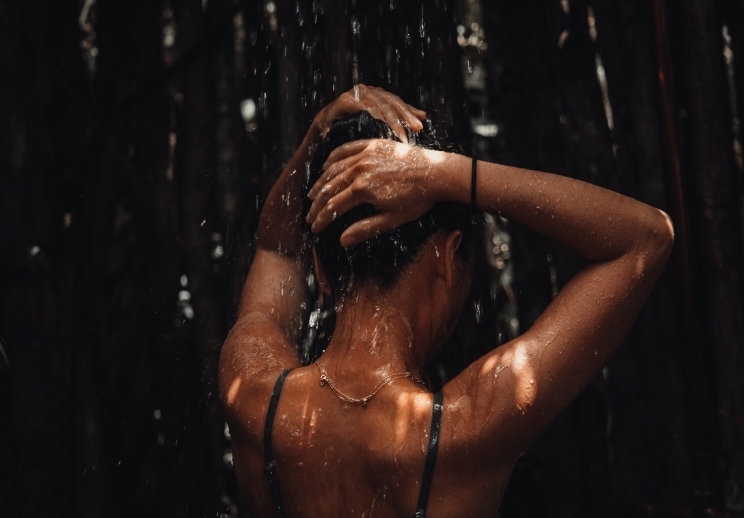Bad Water, Bad Hair: High-Risk States
Why Your Shower Water Might Be Sabotaging Your Skin and Hair
Have you ever looked in the mirror after a shower and wondered why your hair and skin don’t look or feel as good as they should, even after using all the right products? The answer might be flowing out of your showerhead. Let's explore how the quality of your shower water—particularly hard water—could be the unseen culprit behind your hair and skin woes and what you can do about it.
What Is Hard Water?
Hard water has a high mineral content, primarily calcium and magnesium. It becomes “hard” when it percolates through limestone and dolomite. Although not harmful to overall health, these minerals can negatively impact your hair and skin.
Impact of Hard and Unfiltered Water on the Skin
Reduced Lather Efficiency
Hard water reduces the ability of soaps and shampoos to lather, leading to increased use and possible irritation from detergents.
Residue Buildup
Soap residue can clog pores and exacerbate conditions like eczema or acne.
Chalk Particulate Formation
Mineral interactions can form chalky particulates, irritating sensitive skin types.
Soap Scum Formation
Soap scum disrupts the natural turnover of skin cells and weakens the skin barrier, increasing transepidermal water loss (TEWL) and susceptibility to flare-ups.
Impact of Hard and Unfiltered Water on the Hair
Dull and Lifeless Hair
Mineral buildup forms a film over the hair shaft, reducing shine and volume.
Moisture Barrier
The film also blocks moisture penetration, leading to dryness and breakage.
Scalp Issues
Mineral deposits can clog follicles, disrupt oil production, and lead to itchiness or thinning.
Color Fading
Hard water reacts with hair dye, dulling its vibrancy and shortening its lifespan.
Increased Hair Fall
By interfering with the natural hair cycle, hard water can prolong the shedding phase.
Reduced Effectiveness of Products
Shampoo bars often lack chelating agents, making them less effective in hard water areas.
Impact of Chlorinated Water on the Skin
Dryness and Irritation
Chlorine strips away protective oils, worsening eczema and similar conditions.
Compromised Barrier Function
This leads to increased TEWL and a higher risk of irritation and infection.
Increased Acne Breakouts
Excess dryness may trigger the overproduction of oil, contributing to breakouts.
Premature Aging
Dry skin can accelerate wrinkle formation and dullness.
Impact of Chlorinated Water on the Hair
Strips Natural Oils
Results in dry, brittle, and rough-textured hair.
Weakened Hair Structure
Chlorine weakens protein bonds, making hair more fragile.
Color Fading
Its oxidative properties reduce color vibrancy and longevity.
Texture Changes
Hair becomes straw-like and harder to manage.
Scalp Issues
Dryness and flaking may lead to dandruff and discomfort.
Can Arsenic, Lead, and Fluoride in Shower Water Harm Hair?
Yes. Here's how:
- Arsenic: Disrupts hair growth cycles, dries out strands, and irritates the scalp.
- Lead: Reduces natural oils, weakens strands, and dulls appearance.
- Fluoride: Makes hair stiff and brittle; linked to thinning and scalp issues.
States with the Worst Tap Water in the U.S.
States with consistently low water quality include New Jersey, Georgia, Arizona, Ohio, Florida, Texas, Michigan, California, Pennsylvania, and Washington.
How to Protect Hair and Skin from Poor-Quality Water
Whole House Water Softeners
Remove calcium and magnesium throughout your home for full protection.
Shower Filters
A more affordable option that filters minerals and chlorine at the point of use.
Bottled Water for Rinsing
Useful for occasional use, especially the final rinse after shampooing.
Shop
MDhair Derm-Approved Shower Head
MDhair Derm-Approved Replacement Filter
More Info
Benefits of Washing Hair with Filtered Soft Water
FAQs
Q1: What is hard water, and how does it affect my hair and skin?
It contains calcium and magnesium that leave residue, causing dryness and dullness.
Q2: Why does my hair feel heavy after washing?
Minerals form a film over strands, reducing shine and increasing weight.
Q3: Can hard water damage my scalp?
Yes, buildup can block follicles and cause dryness, itching, and thinning.
Q4: Is colored hair more vulnerable to hard water?
Yes, it fades faster due to mineral interactions with hair dye.
Q5: How do I know if I have hard water at home?
Look for signs like soap scum, spotty dishes, stiff laundry, and scale buildup.
Q6: Which states have poor water quality?
New Jersey, Georgia, Arizona, and others due to pollution and aging infrastructure.
Q7: How can I protect myself at home?
Use a water softener or a derm-approved shower filter.
Q8: Can I take temporary steps?
Rinse with bottled water and use MDhair products designed for hard water areas.
Q9: How often should I change my shower filter?
Every 6 months, or as recommended by the manufacturer.
Q10: How does water quality affect the environment?
Cleaner water reduces pollution and supports long-term ecological health.
More info:
Find the most effective hair growth products for you by taking the free hair assessment.




